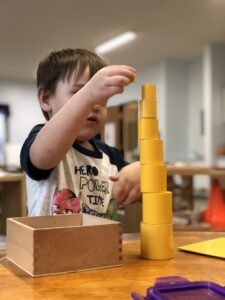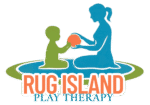About Play Therapy

Birds fly, fish swim, and children play.
-Gary Landreth, Play Therapy: The Art of the Relationship
What is play therapy?
Play therapy is a type of child therapy that uses the power of play to therapeutically address emotional and behavioral challenges. As a licensed mental health professional, I will help your child fully express themselves and their experiences. Together, we will find more effective ways for your child to manage their emotions and behavior.
Why play?
Simply put, because play is the universal language of children. All children play, regardless of where they live, what culture they grow up in, or whether or not they have access to toys. Play is the most natural way for children to express themselves, and it allows them to do so in a more honest, direct, and complete way than with words alone.
Play therapy is also the most developmentally appropriate way for children to address their challenges. Children often lack the verbal language needed to communicate what has happened and the intensity of their feelings. What’s more, the capacity for abstract reasoning and thinking does not fully emerge until adolescence, and the brain continues to mature until approximately age 25. As a result, play is the easiest, most natural way for children to communicate.
Who is Play Therapy for?
Play therapy is most often used with children between the ages of 3 and 12 who are navigating emotional, behavioral, or social difficulties. It can be especially helpful for children dealing with anxiety, trauma, family changes, grief, bullying, or challenges with self-regulation.
This approach also supports children with developmental delays, learning differences, ADHD, autism spectrum disorder, or attachment-related concerns. Through the structure and safety of play therapy, they can build emotional resilience, develop new coping skills, and increase their sense of confidence and connection.
Play therapy principles can also benefit teens. While adolescents may not engage in play the way younger children do, they often respond well to creative and experiential approaches. These methods can help teens explore emotions, manage stress, and express themselves in ways that feel safer and more natural than talk alone. This can be particularly useful for teens who are more reserved, who struggle to open up, or who simply relate better through metaphor and action than direct conversation. Learn more about teens and play therapy by clicking here.
What happens during a play therapy session?
Your child and I will meet in a playroom that has been specially designed to be comfortable, inviting, and safe. It has a variety of toys hand selected to encourage your child’s emotional expression and self-exploration.
Your child can play with any of the toys in many of the ways they would like. I use child-led, nondirective approaches, which means your child will enjoy the freedom to explore their concerns at their own pace. When given the opportunity and the right support, children will choose to work towards healing.
I have been trained to observe how your child plays, and to respond with supportive and nonjudgemental guidance. Over time, I will identify themes in your child’s play and interpret what it means. This allows me to better understand and address your child’s emotional state and emotional needs.
How are parents involved?
Play therapy sessions are typically one-on-one with your child. As the child’s parent/ caregiver, you are an important part of your child’s therapy. Regular communication between sessions is common. Every 4 to 5 weeks, we will have a session without your child present in order to review progress, areas of continuing concern, and work on solving problems outside the playroom.
How long does it take?
It takes as long as it takes. Because I use child-led and nondirective approaches, therapy happens on your child’s timeline. Although I can’t guarantee how many sessions your child will need, recent studies have shown that most children will need an average of 30 sessions. Factors impacting the length of therapy include the age of the child, the severity of their problem, the length of their problem, their unique personality, and family involvement.
I know that feels like a long time, and that you probably want things to be better now. Don’t worry. Most children show improvement much sooner!
Learn more at The Association of Play Therapy.
